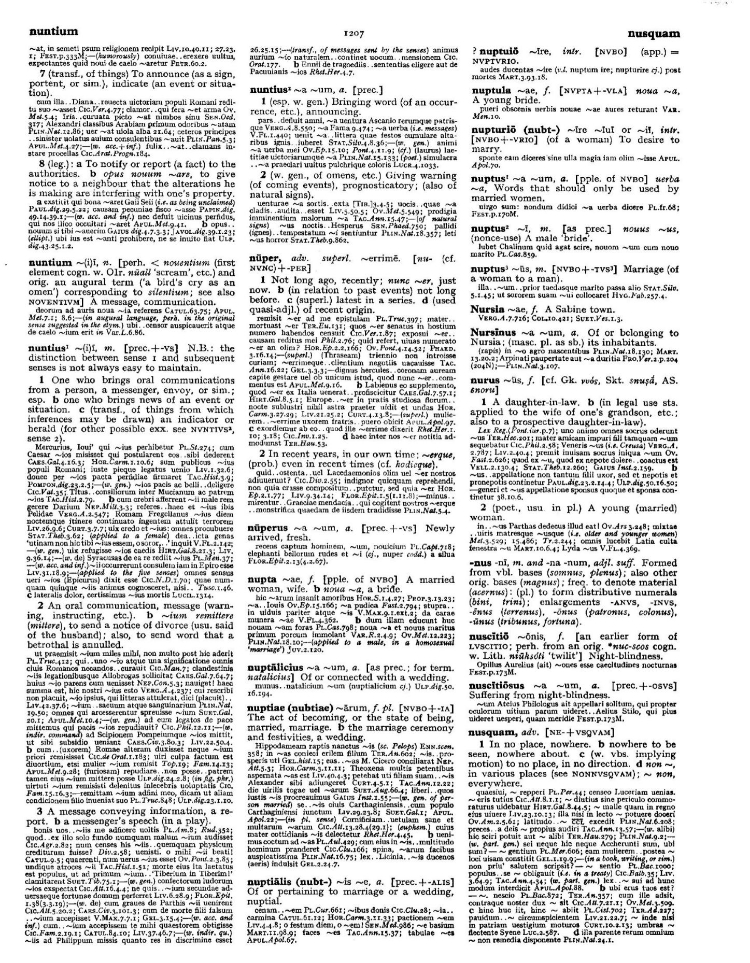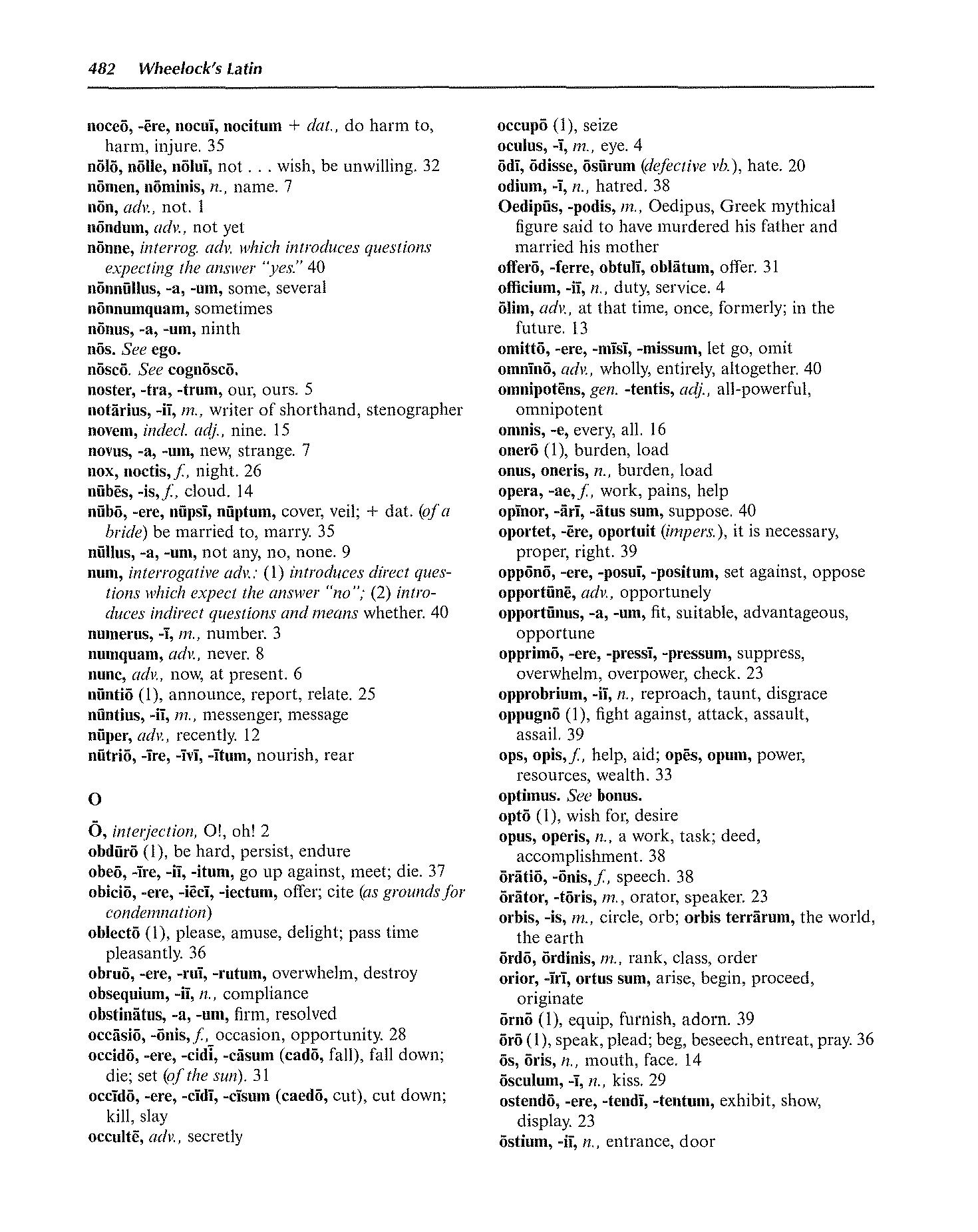
page_listing.tpl
page_subListingDetails.tpl
sub_listingDetails_style1.tpl
sub_listingDetails.title.tpl
nūntius messenger
nūntius is a Latin Noun that primarily means messenger.
Definitions for nūntius
Wheelock's Latin
Noun
- 1
messenger, message
Oxford Latin Dictionary
Noun
- 1
One who brings oral communications from a person, a messenger, envoy, or sim.; esp. (b) one who brings news of an event or situation. (c) (transf., of things from which inference may be drawn) an indicator or herald (for other possible exx. see NVNTVS2, sense2).
- 2
An oral communication, message (warning, instructing, etc.). (b) ~ium remittere (mittere), to send a notice of divorce (usu. said of the husband); also, to send word that a betrothal is annulled.
- 3
A message conveying information, a report. (b) a messenger's speech (in a play).
Adjective
- 1
(esp. w. gen.) Bringing word (of an occurence, etc.), announcing.
- 2
(w. gen., of omens, etc.) Giving warning (of coming events), prognosticatory; (also of natural signs).
Sentences with nūntius
Latin to English
Marcus nūntium in villam ducit.Compare Marcus leads the messenger into the house.
Nūntius dīxit exercitūs Pompeiī superātōs esse.Compare The messenger said that the armies of Pompey had been defeated.
Nuntius Roma, qui certus de suus casus senatus facio, mitto.Compare They sent messengers to Rome, who might inform the senate of their misfortune.
Hic litterate cunctus nuntius confirmo.Compare All the messengers confirmed this letter.
Declension table for nūntius
Cactus2000
| Singular | Plural | |
| Nom. | nūntius | nūntiī |
| Gen. | nūntiī | nūntiōrum |
| Dat. | nūntiō | nūntiīs |
| Acc. | nūntium | nūntiōs |
| Voc. | nūntie | nūntiī |
| Abl. | nūntiō | nūntiīs |
Data sources
Notes
- Definitions
- Frederick M. Wheelock, Wheelock's Latin, 6th ed., rev. Richard A. LaFleur (New York, NY: HarperCollins Publishers, 2005): 482.
- P. G. W. Glare, Oxford Latin Dictionary, Vols. 1-8 (Oxford: Clarendon Press, 1982): 1207.
- Word frequencies
- Christopher Francese, "Latin Core Vocabulary," Dickinson College Commentaries, last modified 2014, http://dcc.dickinson.edu.
- Paul B. Diederich, The Frequency of Latin Words and Their Endings, PhD diss., (Columbia University, 1939).
- Louis Delatte, Suzanne Govaerts, Joseph Denooz, and Etienne Evrard, Dictionnaire fréquentiel et index inverse de la langue latine [Frequency Dictionary and Inverse Index of the Latin Language] (Liège, Belgium: Laboratoire d'analyse statistique des langues anciennes de l'Université de Liège [L.A.S.L.A.], 1981): 119-219.
Bibliography
Allen, Joseph H. Allen and Greenough's New Latin Grammar for Schools and Colleges: Founded on Comparative Grammar. Edited by James B. Greenough, George L. Kittredge, Albert A. Howard, and Benjamin L. D'Ooge. Boston, MA: Ginn & Company, 1903.
Crystal, David. A Dictionary of Linguistics and Phonetics. 6th ed. Oxford, UK: Blackwell Publishing, 2008.
Delatte, Louis, Suzanne Govaerts, Joseph Denooz, and Etienne Evrard. Dictionnaire fréquentiel et index inverse de la langue latine [Frequency Dictionary and Inverse Index of the Latin Language]. Liège, Belgium: Laboratoire d'analyse statistique des langues anciennes de l'Université de Liège (L.A.S.L.A.), 1981.
Diederich, Paul B. The Frequency of Latin Words and Their Endings. PhD diss., Columbia University, 1939.
Francese, Christopher. "Latin Core Vocabulary." Dickinson College Commentaries. Last modified 2014. http://dcc.dickinson.edu/latin-vocabulary-list.
Gildersleeve, Basil L., and Gonzales Lodge. Gildersleeve's Latin Grammar: Third Edition, Revised, and Enlarged. 3rd ed. London, England: Macmillan and Co., 1903.
Glare, Peter G.W. Oxford Latin Dictionary. Vols. 1-8. Oxford, England: Clarendon Press, 1982.
Krüger, Bernd. "Latin Conjugation Tables." Cactus2000. Accessed May 5, 2023. https://latin.cactus2000.de/index.en.php.
Pierson, Nick. "Sound of Text." Accessed October 26, 2019. https://soundoftext.com.
Wheelock, Frederick M. Wheelock's Latin. 6th ed. Revised by Richard A. LaFleur. New York, NY: HarperCollins Publishers, 2005.
Wiktionary Contributors. "Victionarium." Wikimedia Foundation, Inc. Updated March 18, 2019. https://la.wiktionary.org/wiki/Victionarium:Pagina_prima.
Citation
Chicago (17th ed.)
Allo Contributors. "nūntius, nūntiī (n.) - Latin Word Definition." Allo Latin Dictionary. Last modified . Accessed February 20, 2026. http://ancientlanguages.org/latin/dictionary/nuntius-nuntii.
Entry created on . Last updated on .







